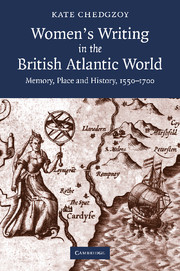Book contents
- Frontmatter
- Contents
- Acknowledgements
- Introduction: ‘A place on the map is also a place in history’
- Chapter 1 ‘The rich Store-house of her memory’: The metaphors and practices of memory work
- Chapter 2 ‘Writing things down has made you forget’: Memory, orality and cultural production
- Chapter 3 Recollecting women from early modern Ireland, Scotland and Wales
- Chapter 4 ‘Shedding teares for England's loss’: Women's writing and the memory of war
- Chapter 5 Atlantic removes, memory's travels
- Conclusion
- Notes
- Bibliography
- Index
Chapter 2 - ‘Writing things down has made you forget’: Memory, orality and cultural production
Published online by Cambridge University Press: 22 September 2009
- Frontmatter
- Contents
- Acknowledgements
- Introduction: ‘A place on the map is also a place in history’
- Chapter 1 ‘The rich Store-house of her memory’: The metaphors and practices of memory work
- Chapter 2 ‘Writing things down has made you forget’: Memory, orality and cultural production
- Chapter 3 Recollecting women from early modern Ireland, Scotland and Wales
- Chapter 4 ‘Shedding teares for England's loss’: Women's writing and the memory of war
- Chapter 5 Atlantic removes, memory's travels
- Conclusion
- Notes
- Bibliography
- Index
Summary
Where I come from people have long memories. Any one of us can recite our ancestry back for several hundred generations. I can listen to a speech for an hour and then repeat it for you verbatim or backwards without notes. Writing things down has made you forget everything.
My grandmother distrusts writing.
Part Scottish and part Amerindian, Chofy, the narrator of Pauline Melville's novel The Ventriloquist's Tale tells a story which sums up the complex interplay of orality and literacy, remembering and forgetting, in the space where cultures meet. Set in modern Guyana, Melville's novel treats the relationship between orality, writing and cultural identity in a postcolonial context. Crucially, it foregrounds the salience of power in encounters between oral societies and those that privilege script and print.
Chofy highlights the sense of a living connection to the past maintained in primarily oral cultures, not only through the recitation of genealogies, but through story-telling, song and performance. The ability to memorize a speech aurally and then repeat it ‘backwards without notes’ suggests that this is not a passively reproductive form of memorization, but one that enables the recalling subject to recreate what has been stored away in memory.
- Type
- Chapter
- Information
- Women's Writing in the British Atlantic WorldMemory, Place and History, 1550–1700, pp. 48 - 79Publisher: Cambridge University PressPrint publication year: 2007

